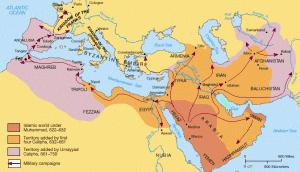Ed West is a British author of compact, popular histories, mostly focused on the Middle Ages. His most recent is The Path of the Martyrs: Charles Martel, The Battle of Tours and the Birth of Europe on the 732 battle that may have been a decisive check on the advance of Islam.

The book is really two parts, the historical background to the battle and the European world that emerged from it. The first begins with an overview of Europe and the Mediterranean as they emerged from the ruins of Roman hegemony, from the fractious barbarian kingdoms in the west to the enduring Byzantine Empire in the east. Against this backdrop arise the two powers that will showdown at Tours: the Islamic caliphate and the Frankish kingdom.
West adopts the chatty register of a passionate amateur, interspersed with frequent quotes from historical authorities. Besides saving the author narrative labor, this provides the reader with a useful bibliography and broad sampling of past historians’ opinions. The footnotes do, unfortunately, lack page numbers for the sources. This selection presents a decidedly non-revisionist view of things, depicting a hopelessly backward Frankish kingdom set against an advanced and cosmopolitan Muslim Spain.
Clash of Civilizations
The central drama of the book, the Battle of Tours, is sparely described in historical sources. West makes up for this lack by fleshing out the details we know of each. The Muslims were commanded by the governor of Spain, Abd ar-Rahman, and were an international medley of troops. These included Spanish and African infantry levies and a superb corps of light cavalry. The Franks, commanded by the Frankish viceroy Charles Martel, were mostly composed of stolid, ax-wielding infantry, flanked by much smaller wings of heavy cavalry. Although the infantry seems to have done most of the fighting on the Frankish side, the battle is remarkable for being the first in which heavy cavalry won the day—in this case, by attacking the Muslims’ camp as their infantry advanced.

The significance of the Battle of Tours is a question of ongoing debate, one which can never be satisfactorily answered. Was it a climactic clash of civilizations, or merely a raid disrupted? And even if it was the latter, was it not so great a check as to cow any future Spanish Muslim rulers from attempting the conquest of Gaul? On the other hand, was Moorish Spain not bound to disintegrate before any serious effort at conquest could get underway?
Tours was not the first defeat of the Muslims north of the Pyrenees—they were badly beaten outside Toulouse in 721—nor was it their last. The Moors would launch several more long-distance raids, all of which were beaten by Charles Martel. West surveys historians’ opinions of the battle, from the overwrought descriptions of Enlightenment and Victorian authors to blasé modern scholars who cannot admit that anything was truly glorious. On this question, he sides more with the former group, while tempering their flights of rhetoric.
Birth of the West

This debate is secondary to the larger theme of Path of the Martyrs, which is the world formed in the wake of the Battle of Tours. Whatever the significance of the battle itself, Charles Martel’s victories against the Muslims and others secured Gaul for the Frankish kingdom. His grandson Charlemagne would forge this realm into the Carolingian Empire, the basis for the new civilization forming in Western Europe as it emerged from the depths of the Dark Ages.
Ed West’s book is a good introduction to the Battle of Tours and the turbulent period around it. Its many anecdotes, digressions, and good bibliography provide paths for further study, but it can be enjoyed on its own. The Path of the Martyrs is available on Kindle Unlimited or costs $3.99 to purchase. You can read more of the author’s writing at his website and follow him on Twitter.
